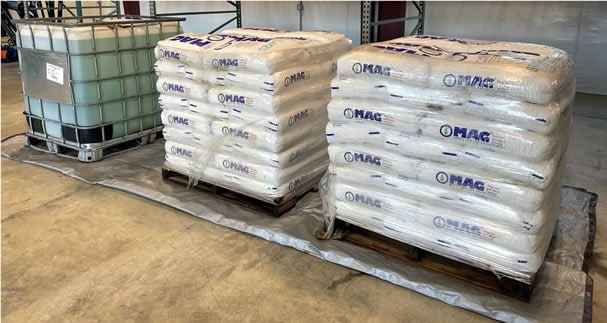Dust Control Products
High Quality & Effective
Dust Control Chemicals

Dust Suppression Products
Using our dust control products will effectively and immediately suppress dust at the time of treatment in most cases. A single application of dust suppression chemicals like calcium chloride or magnesium chloride can provide lasting results ranging from a few weeks to many months or even longer, depending on various factors such as conditions, soil type, and frequency of rainfall. There is a cumulative effect; each application of our products contributes to their longevity.
Our solutions are particularly well-suited for rural road maintenance, access roads to recreational fields, riding arenas, recreational surfaces, and clay tennis courts. Most importantly, our products are designed to be gentle on paws, hooves, and skin, with magnesium chloride being specifically approved for use in sensitive environmental areas.
We also offer options compliant with OSHA regulations for dust control conditions, ensuring a safe and approved choice for your needs.

Calcium Chloride for Dust Control
Available in Super Sacs, 50 lb Bags, or Liquid
Calcium Chloride Dust Control products are known for being a long-lasting solution to suppressing dust outdoors.

Magnesium Chloride for Dust Control
Available in Super Sacs, 50 lb Bags, or Liquid
Magnesium Chloride Dust Control products are known for being an environmentally friendly way to suppress dust outdoors.
Reduce dust on roads, construction sites, unpaved parking lots, horse arenas, fields, rec trails, in the mining industry, and more!
Calcium Chloride & Magnesium Chloride
Calcium Chloride and Magnesium Chloride, renowned for their ice-melting capabilities, have expanded their utility to include effective dust control. These versatile compounds possess a unique hygroscopic quality, enabling them to attract and retain moisture from the air, making them highly adept at dust suppression.
Utilizing Calcium Chloride for dust control not only proves cost-effective but also enduring in its effectiveness. With over a century of trusted use in the Maryland, Virginia, and Washington D.C. regions, Calcium Chloride (CaCl2) plays a vital role in reducing dust dispersion across various terrains, including dirt and gravel roads, construction sites, baseball fields, solar farms, and quarries. The risks posed by airborne dust extend to the health of communities, homes, wildlife, and nearby vegetation. Untreated dusty roads can foster dust mites, soil erosion, and harm underwater plant life, underscoring the urgent need for effective dust control measures.
Magnesium Chloride stands as a proven solution for dust control across diverse landscapes, including dirt roads, construction sites, baseball fields, and aggregate surfaces. Similar to Calcium Chloride, it exhibits hygroscopic properties, drawing moisture from the atmosphere to create a damp surface. This inherent quality allows it to agglomerate dust particles, reducing road wear and maintenance needs.
While Calcium Chloride offers longer-lasting dust control, Magnesium Chloride excels in encapsulating fine dust particles and strengthening surfaces. Its smaller molecular structure enables it to form bonds with even the tiniest dust particles, ensuring sustained dampness and containment.
Revealing the Wonders of Dust Suppression
The enchantment of calcium chloride and magnesium chloride lies in their capacity to suppress dust disturbances. When administered to surfaces or dispersed into the air, these compounds trigger a process of moisture absorption. By drawing moisture from the surroundings, they render dust particles heavier, thwarting their dispersion into the air. This leads to improved air quality, addressing the challenges posed by airborne particles and safeguarding both worker health and the environment.
The benefits of utilizing calcium chloride and magnesium chloride for dust control transcend their primary function. These products exhibit water-soluble properties, enabling them to form a thin film when applied to surfaces. This film, in turn, reduces the surface tension of water, thereby enhancing the efficacy of subsequent water treatments. Additionally, the hygroscopic characteristics of these compounds contribute to stabilizing road surfaces and serving as a protective barrier against soil erosion.
